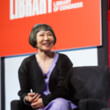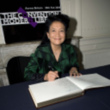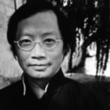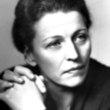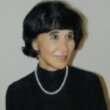Becoming Madame Mao: A Novel
(Libby/OverDrive eBook, Kindle)
Available Platforms
Description
More Details
Excerpt
Similar Titles From NoveList
Similar Authors From NoveList
Published Reviews
Booklist Review
Min has chosen no small topic to tackle in her second novel. Madame Mao, a major instigator of the Cultural Revolution in China and a woman responsible for both the terror and deaths of countless people, is a risky choice for the central character. But what Min has created here is a stunning, powerful portrait of a woman with complex motivations and strong passions; a woman who, ultimately, is difficult to summarily judge and dismiss. Min's Madame Mao is a chameleon: she alters herself as her circumstances change and her ambitions grow, but she never loses the force of will that drives her. She begins as Yuhne, who as a young girl rejects her foot bindings and the husband chosen for her to pursue a career in opera. After a second failed marriage and a horrifying prison experience, she becomes Lan Ping, and her sympathy with the Communist Party grows. In the town of Yenan, she meets and falls in love with Chairman Mao, a charismatic and ambitious Communist leader who renames her Jiang Ching after they marry. Min's graceful style presents the story from two perspectives: a first-person point of view, Madame Mao herself; and a third-person narrative voice that dispassionately moves the tale forward. Madame Mao clings to the belief that she is a "peacock among hens" and sees herself as the heroine of the opera that is Mao's rise to power and the Cultural Revolution. Min's tale of a woman with too much power in a world that completely lacks stability is nothing less than brilliant. --Kristine Huntley
Publisher's Weekly Review
Historical fiction acquires new luster and credibility in Min's brilliant evocation of the woman who married Mao and fought to succeed him. As she proved in her memoir, Red Azalea, Min is a forceful writer, but her first novel, Katherine, did not prepare us for the highly dramatic, psychologically penetrating and provocative narrative she presents here. A girl called Yunhe is born to a rural concubine in 1919; she renames herself Lan Ping when, in 1934, she runs away to Shanghai with ambitions to be an actress, and later joins the Red Army; and finally, she is dubbed Jiang Ching by the man she marries, Mao Zedong. Madame Mao has become a myth, but Min has the background and the insight to imagine her afresh, and to create a complex psychological portrait of a driven, passionate woman and a period of history in which she would suffer, rise and prosper, and then fall victim to her own insatiable thirst for power. Min draws Madame Mao with bold, arresting strokes, gives her a fierce, imperious voice and a personality devoid of humility or self-knowledge. Lan Ping sets out to seduce the charismatic Mao, and wins him--for a time--until her jealousy, the machinations of his trusted aides, and Mao's own loss of interest cast her into limbo. By then a veteran of the inner circle betrayals that Mao encouraged, Jiang Ching's attempts to wrest personal power, but that becomes her undoing. As with a fine ink brush, Min details her heroine's series of love affairs and marriages, divorces and acrimonious partings, roles in Chinese opera and movies, endurance in the shadow of Mao's disfavor, desperate ploys to regain his attention, and brief time in the limelight during the Cultural Revolution. As a chronicle of ambition, betrayal, murder, revenge, barbaric cruelty, paranoia and internecine rivalry, the narrative speeds through its turbulent time frame: 1919-1991. But it is foremost a character study of a determined, vindictive, rage-filled, cruel and emotionally needy woman who flourished because she reinvented herself as an actress in different, self-defined roles-- and because China was ready for her. Min uses several effective prose devices to spin her narrative at top speed. Short first- and third-person vignettes juxtapose Madame Mao's early experience with the comments of an omniciscient narrator who relates pivotal circumstances to events that will grow from their consequences. Such foreshadowing not only raises tension, it also helps readers construct a mental chart of historical figures and events. Striking metaphors and vivid Chinese proverbs enhance Min's tensile prose, but it is her trenchant comments about the ways in which powerful individuals can paint bold colors on the panorama of history that distinguishes her spellbinding novel. Agent, Sandra Dijkstra. 10-city author tour. (June) (c) Copyright PWxyz, LLC. All rights reserved
Library Journal Review
Min, who fled China in 1984 and later recounted her experiences there in Red Azalea, here rather daringly re-creates the life of Jiang Chang, wife to Mao and a political power in her own right. (c) Copyright 2010. Library Journals LLC, a wholly owned subsidiary of Media Source, Inc. No redistribution permitted.
Kirkus Book Review
The author of a wrenching memoir, Red Azalea (1994), turns to fiction and goes back to her native China to explore the story of the woman once known to the world as the `white-boned demon.` Like all girls of her class, Jiang Ching had her feet bound at the age of four. Unlike most, she never forgot the pain and humiliation, even after she became Madame Mao, the most powerful woman in China in the late '60s and '70s. Her mother's words still rang in her ears: "Think of yourself as grass, born to be stepped on." Jiang Ching never could. Instead, she channeled her agony and humiliation into a persona that allowed her to view herself as a `peacock among hens.` The author tries to portray Madame Mao as a feminist who became caught up in the chaotic political beliefs of the man she loved. But the protagonist remains a mysterious and ambiguous figure, despite Min's efforts to humanize her. The aspects of Jiang Ching's personality emphasized here--her desire for acceptance, her need for love, and her inability to express intimacy--do not create understanding or empathy for her often ruthless and megalomaniac behavior. Capable and accomplished though Min is, she never truly captures Jiang Ching's character. A remarkable act of historical imagination, but readers are left with more questions than answers. Copyright ©Kirkus Reviews, used with permission.
Booklist Reviews
/*Starred Review*/ Min has chosen no small topic to tackle in her second novel. Madame Mao, a major instigator of the Cultural Revolution in China and a woman responsible for both the terror and deaths of countless people, is a risky choice for the central character. But what Min has created here is a stunning, powerful portrait of a woman with complex motivations and strong passions; a woman who, ultimately, is difficult to summarily judge and dismiss. Min's Madame Mao is a chameleon: she alters herself as her circumstances change and her ambitions grow, but she never loses the force of will that drives her. She begins as Yuhne, who as a young girl rejects her foot bindings and the husband chosen for her to pursue a career in opera. After a second failed marriage and a horrifying prison experience, she becomes Lan Ping, and her sympathy with the Communist Party grows. In the town of Yenan, she meets and falls in love with Chairman Mao, a charismatic and ambitious Communist leader who renames her Jiang Ching after they marry. Min's graceful style presents the story from two perspectives: a first-person point of view, Madame Mao herself; and a third-person narrative voice that dispassionately moves the tale forward. Madame Mao clings to the belief that she is a "peacock among hens" and sees herself as the heroine of the opera that is Mao's rise to power and the Cultural Revolution. Min's tale of a woman with too much power in a world that completely lacks stability is nothing less than brilliant. ((Reviewed March 15, 2000)) Copyright 2000 Booklist Reviews
Library Journal Reviews
Min, who fled China in 1984 and later recounted her experiences there in Red Azalea, here rather daringly re-creates the life of Jiang Chang, wife to Mao and a political power in her own right. Copyright 2000 Cahners Business Information.
Library Journal Reviews
In her third work, Min, author of the highly acclaimed Red Azalea and Katherine, produces an engaging historical novel about the life of Jiang Ching better known as Madame Mao, the wife of China's former chairman Mao Tse-Tung. Although fiction, this work is backed by numerous references and three years of research. Madame Mao's tale begins as readers meet young Yunhe, who at the age of four endures the pain of foot binding and later defies her mother by ripping the cloths off her feet. In these early pages, readers learn more of Yunhe's strong and rebellious nature as she matures and changes her name to Lan Ping. In her new identity, Lan Ping pursues the life of an actress, seeking love and attention along the way. The novel takes another turn, more heavily steeped in its political climate, after Lan Ping begins her affair with Mao Tse-Tung. After she marries him and receives her new name from him (Jiang Ching), the reader follows her intense determination as she moves toward becoming China's "leading lady." Writing from her own experiences in China during the Cultural Revolution, Min brings to her work a sense of realism and authority. Her characterization of Madame Mao is so strong that one may tend to forget that this work is a novel and not a true biography. Definitely recommended for both public and academic libraries. [Previewed in Prepub Alert, LJ 2/15/00.] Shirley N. Quan, Orange Cty. P.L., Fountain Valley, CA Copyright 2000 Cahners Business Information.
Publishers Weekly Reviews
Historical fiction acquires new luster and credibility in Min's brilliant evocation of the woman who married Mao and fought to succeed him. As she proved in her memoir, Red Azalea, Min is a forceful writer, but her first novel, Katherine, did not prepare us for the highly dramatic, psychologically penetrating and provocative narrative she presents here. A girl called Yunhe is born to a rural concubine in 1919; she renames herself Lan Ping when, in 1934, she runs away to Shanghai with ambitions to be an actress, and later joins the Red Army; and finally, she is dubbed Jiang Ching by the man she marries, Mao Zedong. Madame Mao has become a myth, but Min has the background and the insight to imagine her afresh, and to create a complex psychological portrait of a driven, passionate woman and a period of history in which she would suffer, rise and prosper, and then fall victim to her own insatiable thirst for power. Min draws Madame Mao with bold, arresting strokes, gives her a fierce, imperious voice and a personality devoid of humility or self-knowledge. Lan Ping sets out to seduce the charismatic Mao, and wins him for a time until her jealousy, the machinations of his trusted aides, and Mao's own loss of interest cast her into limbo. By then a veteran of the inner circle betrayals that Mao encouraged, Jiang Ching's attempts to wrest personal power, but that becomes her undoing. As with a fine ink brush, Min details her heroine's series of love affairs and marriages, divorces and acrimonious partings, roles in Chinese opera and movies, endurance in the shadow of Mao's disfavor, desperate ploys to regain his attention, and brief time in the limelight during the Cultural Revolution. As a chronicle of ambition, betrayal, murder, revenge, barbaric cruelty, paranoia and internecine rivalry, the narrative speeds through its turbulent time frame: 1919-1991. But it is foremost a character study of a determined, vindictive, rage-filled, cruel and emotionally needy woman who flourished because she reinvented herself as an actress in different, self-defined roles and because China was ready for her. Min uses several effective prose devices to spin her narrative at top speed. Short first- and third-person vignettes juxtapose Madame Mao's early experience with the comments of an omniciscient narrator who relates pivotal circumstances to events that will grow from their consequences. Such foreshadowing not only raises tension, it also helps readers construct a mental chart of historical figures and events. Striking metaphors and vivid Chinese proverbs enhance Min's tensile prose, but it is her trenchant comments about the ways in which powerful individuals can paint bold colors on the panorama of history that distinguishes her spellbinding novel. Agent, Sandra Dijkstra. 10-city author tour. (June) Copyright 2000 Cahners Business Information.
Reviews from GoodReads
Citations
Min, A. (2001). Becoming Madame Mao: A Novel . Houghton Mifflin Harcourt.
Chicago / Turabian - Author Date Citation, 17th Edition (style guide)Min, Anchee. 2001. Becoming Madame Mao: A Novel. Houghton Mifflin Harcourt.
Chicago / Turabian - Humanities (Notes and Bibliography) Citation, 17th Edition (style guide)Min, Anchee. Becoming Madame Mao: A Novel Houghton Mifflin Harcourt, 2001.
Harvard Citation (style guide)Min, A. (2001). Becoming madame mao: a novel. Houghton Mifflin Harcourt.
MLA Citation, 9th Edition (style guide)Min, Anchee. Becoming Madame Mao: A Novel Houghton Mifflin Harcourt, 2001.
Copy Details
| Collection | Owned | Available | Number of Holds |
|---|---|---|---|
| Libby | 1 | 1 | 0 |




























